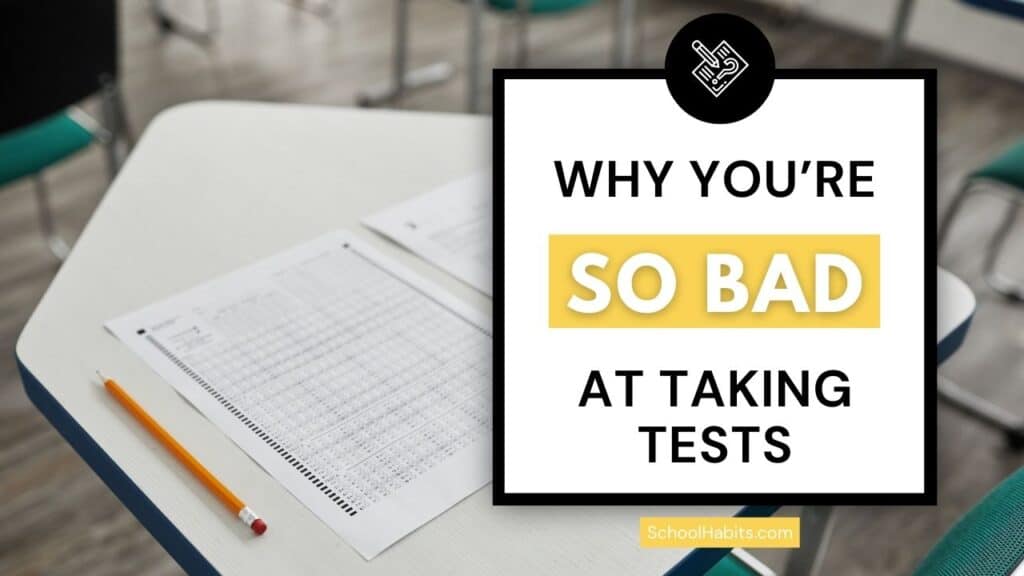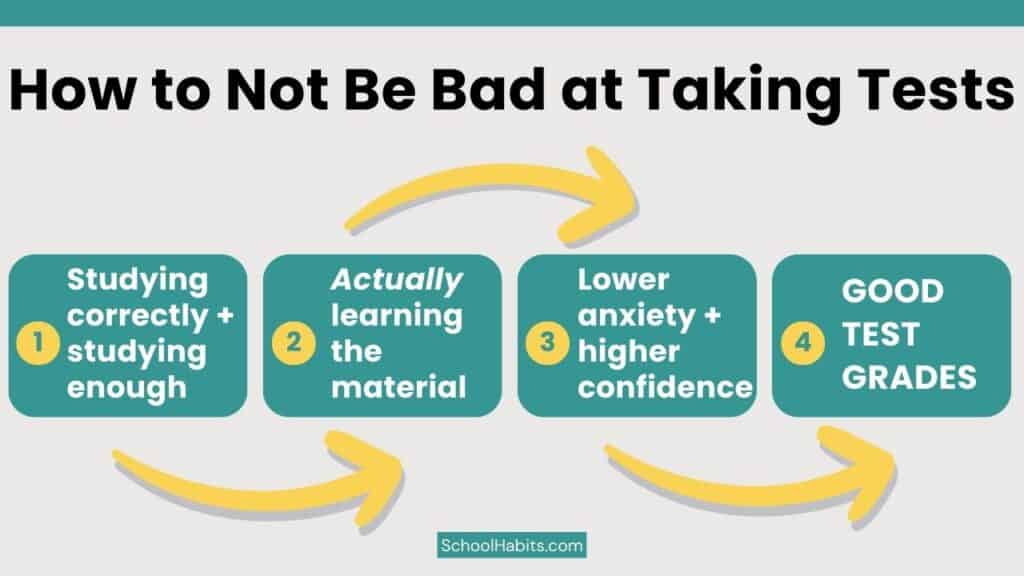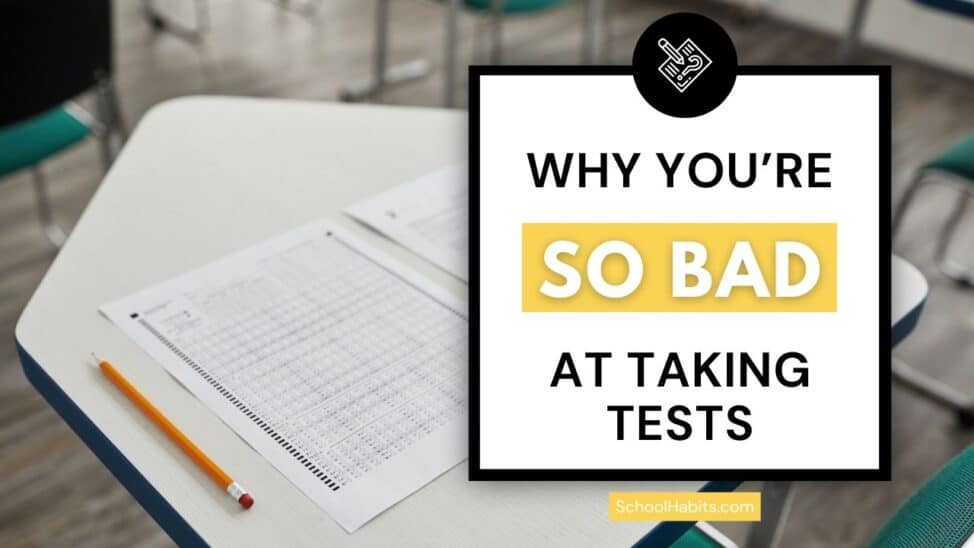
By Katie Azevedo, M.Ed.
“I get good grades on my homework but I’m bad at taking tests.” If you’ve ever said or thought this, then keep reading because I’m going to reveal to you what’s really going on.
It might be true that your class participation, projects, and homework grades are higher than your test grades. But by no means at all does that mean you’re bad at taking tests.
Even if you’ve always been “bad” at taking tests, I still make the argument that you’re not really bad at taking tests.
In fact, I argue that there’s no such thing as a “bad” test-taker. Curious? Read on.
Why You’re Bad at Taking Tests
With one exception, which I explain at the end of this post, the reason why you’re bad at taking tests is that you don’t know the material well enough to be tested on it.
One more time for the people in the back: The reason why you’re bad at taking tests is because you don’t know the material well enough to be tested on it.
Here’s the truth, whether it goes against everything you’ve believed about yourself or not: If you are absolutely and properly prepared for a test – and you know the material inside and out – then you will do well on the test.
Now, your first instinct might be to push back and say, “No way. I study and I still do badly on tests.” I hear you and I know that’s a really frustrating situation.
What’s really happening is one of two things (or both):
- You’re studying the wrong way, or
- You’re not studying enough
Let’s look at each of these two reasons and figure out what’s going on.
1. You’re studying the wrong way
Most students use passive study methods. These “methods” include looking over notes, skimming through textbook chapters, “reviewing” a teacher-made study guide or even using premade digital flashcards in something like Quizlet (yes, even if your teacher made them). These are the top three popular “study methods” that are a total waste of time.
The problem with passive studying is that it takes a lot of time and leaves you with the misleading feeling that you’ve truly studied, when you actually haven’t.
The only real type of studying involves active recall. Active recall is when you put yourself in the position of trying to come up with answers to questions without having any resources in front of you. Yes, this is uncomfortable. Yes, this is hard. But this is the only way our brains actually make sense of and store information for future retrieval.
Active recall methods include:
- Analog flashcards that you make yourself
- Taking practice tests and quizzes
- Doing practice questions and problem sets
- Creating and filling in blank study guides that… you guessed it… you make yourself
- Having someone ask you questions while you verbally answer them
When you use active recall study techniques to the point that you can absolutely (and honestly) answer all your practice questions without peaking at your notes or at the answers, then and only then do you know the material.
And when you know the material – when you really know the material – then you’ll do well on your test. Even if your teacher phrases the questions differently or asks different questions about the material, you’ll be fine. You’ll be fine because you really know it – because you tested yourself a million times before the test using active recall methods.
On the other hand, using passive recall study methods like rereading handouts and looking over notes, gives you false security by seeing the content, but not understanding it.
As you read through your notes, you might think you understand it and you might think yeah I know that … BUT DO YOU REALLY?
The only way to be able to answer questions on a test is to be able to answer those same questions before the test. Active recall is how you do that.
2. You’re not studying enough
The second reason why you’re bad at taking tests could be that you’re not studying enough. Studying to the point of really learning something takes longer than we want it to. The learning process – on a cellular level – takes the time it takes, regardless of how we feel about it.
You may already be using active recall techniques during your study sessions, in which case you’re ahead of most students. But are you having enough study sessions? That’s a question you need to answer honestly.
When we study something, it kind of hangs out in our short-term memory for the duration of that study session. This is cool and it’s definitely the first step of learning information, but our short-term memory is temporary.
In order to recall (remember) information during a test, the information must be in your long-term memory, not your short-term memory. To move something from short-term to long-term, you must study it multiple times over a period of at least a few days (weeks is better) using spaced repetition.
Spaced repetition is the process of studying material in short bursts (20-45 minutes) during multiple study sessions over an extended period of time. This is my complete Spaced Repetition Tutorial.
If for some reason you only have one or two days to study for a test (through no fault of your own, of course, use these study strategies.

The One Legitimate Reason Why You’re Bad at Taking Tests
At the beginning of this post, I teased that there was one legitimate reason why you might be bad at taking tests. And here it is: Severe test anxiety.
Severe test anxiety can prevent you from accessing cognitive tools, memories and knowledge. If you have severe test anxiety, you’re probably familiar with the terror of “going blank” when you take tests.
But … and this is a big but … I STILL argue that you can drastically reduce your test anxiety with proper preparation (active recall) and proper duration (spaced repetition).
Hear me out: If you use active recall techniques for multiple days (weeks, if you can) leading up to your test, then you will have proven to yourself over and over again that you know the material. This will increase your confidence because you’ll have actual evidence that you know your stuff. Do you follow me?
Let’s say that you make a study guide with all the possible test questions on it. Then over multiple study sessions over multiple days, you get to the point where you can fill in every question without an issue. There’s your proof! There’s your evidence that you know your material. When you take the real test, there will be no doubt about whether or not you know the content.

